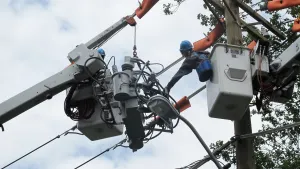More Stories
An ambulette picks up Paul Wool's father, John, three times a week and takes him to his lifesaving dialysis treatment. No one showed up on Monday.
"I had to basically have him lift himself up and assisted him into the car and lifted his feet and put him in, took his wheelchair, collapsed the wheelchair, put it into the back of the car, and then drive him to dialysis, and reverse the whole thing," Wool recounted.
He's one of the lucky ones. Most family members either don't have the right vehicle or the physical strength required to transport.
But Wool and his father will have to come up with a solution because the ambulette companies in Westchester have all closed, affecting about 1,000 medical trips a day.
And it all comes down to money.
"Westchester has not had a rate increase in 20 years," says Ed Kelley, of United Transportation Providers of Westchester.
He says Westchester County ambulettes have the lowest Medicaid rates in the New York metro area, and one of the highest cost's of living.
Kelley says it costs each company about $70 per ride.
"Thats the cost of gas, the cost of the wages for the driver, thats the cost of the insurance, the vehicle, their dispatch staff who are answering the phones," he explained.
The cost of purchasing an ambulette is about $90,000, plus about $22,000 a year in insurance per vehicle.
With more money going out than coming in, it's simple math.
Kelley says as long as the companies continue to function with this rate pay, nothing will change.
"It's only if the service stops that they say they might have to pay more," he explained. "I believe we will have a crisis, 911 is going to be overwhelmed with calls, hospitals are going to be overwhelmed with people being admitted because they couldn't get their dialysis or chemotherapy."
"People are going to die, this is unacceptable, this shouldn't have happened," added Wool.
More from News 12
1:54

BLIZZARD WARNING: The Hudson Valley braces for crippling snowstorm

LIVE UPDATES: Strong gusts, heavy snow to blanket the Hudson Valley tonight into Monday

TIMELINE: When to expect the worst of the blizzard

Why this potential blizzard could produce thundersnow

AAA warns of power outages and dangerous travel as nor’easter approaches
